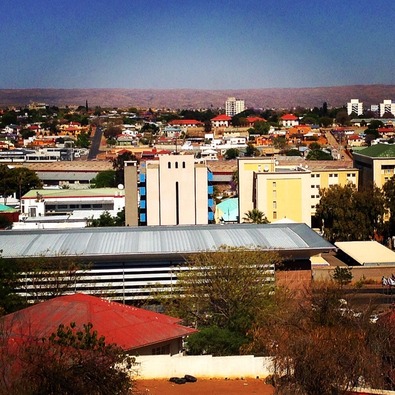-City of Windhoek, Namibia
We are settling into life here in Namibia, a land of many contrasts. Arriving after about 26 hours of travel on October 16th, our driver (I will refer to him as Joel) finds us, helps us load our baggage into his massive vehicle, and takes us to our Airbnb, where we will stay for the first week. (Some people are surprised there is Airbnb in Namibia, but apparently they have it almost everywhere in the world excluding North Korea and Iran).
He asks us why we are in Namibia and I try to explain my Fulbright project—that I will be researching customary law systems and what they mean for women. He tells us that he is Herero, while his wife is Ovambo (Ovambos make up about half the population in Namibia). He also tells us that because of this, their families have not (fully) accepted their union—only a quarter to a third of those invited to the wedding attended and his parents do not refer to his wife as such. While this seemed like a painful and frustrating situation to me, Joel is more interested in what this means for their children. He recognizes that this means their children will not have to (or possibly even be allowed to) live in traditional communities or live under traditional justice systems. They will have more choices in everyday life and more opportunities for education and careers.
It struck me how much of a transitional time it is right now in Namibia—and that it has been for a number of years. Many people still live in traditional communities where disputes are resolved based on customary, unwritten rules. These customary law systems are based on flexibility (procedurally and substantively) and community values, quite a shock to the system for an American attorney. These remote areas contrast significantly with cities like Windhoek and Swakopmond, where any sort of cuisine, hotel, leisure activity, shopping, or any other modern need or want is accessible. Further, the rules in traditional justice systems contrast with the civil court system (additionally, the geographic areas in which traditional/customary law systems apply is largely based on the east to west Red Line border, separating the northern part of the country from the south, but more on that later).
These worlds are certainly colliding and changing. Young people like Joel and his wife choose to marry outside of their communities and to live in Windhoek. Joel told us that this is quite common today. Modern technologies like cell phones are and have been available in remote, traditional communities. Legal pluralism is still very much present, but perhaps today individuals are more willing to risk offending their traditional authorities to appeal unfavorable decisions in the civil court system. I intend to find out if, and how often, women appeal traditional/community court decisions to the civil courts (and also the sorts of rulings they receive from traditional and community courts). I also intend to find out if women are ever appointed as decision makers or “Councilors” in these systems. These are complicated questions given the existence of many different groups and sub-groups and the intricate, ever-changing rules.
Windhoek is a city largely lived behind high gates and electric fences. The U.S. State Department considers it to be high risk for crime (mostly theft and property-related crime). A country that lived under apartheid rule until independence in 1990, there is still significant disparity in wealth—largely but not exclusively based on race. The wealth disparity has improved since the data available when I was here in 2010—the gini-coefficient (100 being perfect inequality by this measure) went from between 74.3 and 70.7 in 2003 (one of the most unequal countries in the world) to between 61.3 and 59.7 in 2010 (still quite unequal).
The societal contrasts are quite obvious when you spend time here. In central Windhoek, there are exquisite homes and posh restaurants with distinct flora and architecture (with high gates and security of course). Not far from the city center is Katatura, a township created following the forced removal of blacks in 1961 (when Namibia was still the South-West Africa territory and governed under South African apartheid rule). Katatura has more going for it today, but still has quite a way to go in terms of development. It remains a relic of a not-too-distant oppressive past.
I do not mean to paint a negative picture of Namibia—the country has come quite a ways in 24 years. The dualism in society that I have experienced in terms of the law, people, housing, and cultural events is, if nothing else, fascinating. I suspect that over time these high walls (and gates) will erode.
Living in the world. Humanitarian. Advocate for health, human rights and equality. Documenting experiences and observations.

